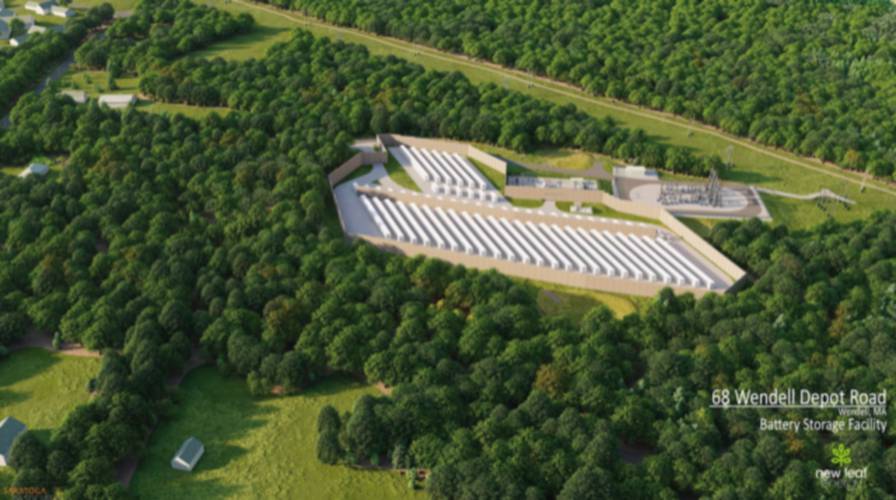Citizens group asks court to overturn AG decision on battery-storage bylaw in Wendell

A local citizens group called No Assault & Batteries (NAB) had vigorously opposed Lowell-based New Leaf Energy’s proposed construction of a 105-megawatt battery storage facility off Wendell Depot Road in Wendell. The company rescinded its proposal in the summer of 2024. NAB had proposed a bylaw regarding the licensing of battery energy storage systems, including those powered by lithium-ion batteries, and it was passed overwhelmingly at a special Town Meeting in May 2024 only to get rejected by the state Attorney General’s Office for failing to comply with procedural safeguards embedded into state zoning laws. CONTRIBUTED
| Published: 05-28-2025 3:07 PM |
WENDELL — The citizens group that formed in 2023 in opposition to a since-withdrawn proposal for a battery storage facility has filed a motion asking the Land Court to overturn the state Attorney General’s rejection of the group’s proposed bylaw.
Wendell residents voted 100 to 1 at a special Town Meeting in May 2024 to give their blessing to the addition of a general bylaw the group No Assault & Batteries had proposed to deal with the licensing of battery energy storage systems, including those powered by lithium-ion batteries. However, the law requires final approval by the state Attorney General’s Office, which on Nov. 14 shot down the bylaw for failing to comply with procedural safeguards embedded into state zoning laws. The ruling stated the warrant article needed to be adopted as a zoning bylaw, rather than a general bylaw, because it was written to regulate land use.
“The attorney general is authorized to disapprove a bylaw that conflicts with state law or the Constitution,” Nicole B. Caprioli, assistant attorney general, wrote in a letter to Town Clerk Anna Wetherby. “The attorney general does not review the policy arguments for or against the enactment of a bylaw.”
But NAB has enlisted the help of Springfield attorneys Jesse Belcher-Timme and Talia Williams, who earlier this month filed a motion to request the state Land Court rule in their client’s favor.
“The adoption of a bylaw by voters at a Town Meeting is entitled to a strong presumption of validity,” the motion states, citing specific case law. “The Attorney General may only disapprove of a bylaw if it directly violates state substantive or procedural law.”
NAB member Al Norman, who helped draft the proposed bylaw, said he hopes for a decision by the end of the summer. In defending his opposition to the battery storage facility, Norman cited major fires on sites around the world, including in New York, California and South Korea.
“We didn’t want Wendell to be a guinea pig for this technology,” Norman said. “It’s the kind of project you don’t want to have in a forest.”
The attorneys state Wendell was compelled to adopt the battery energy storage system bylaw to address concerns regarding health, safety and public welfare. The Wendell Selectboard penned a letter in support of the bylaw and outlined “grave risks” to the public, namely fire, explosion and release of toxic gasses in a “thermal runaway” event.
Article continues after...
Yesterday's Most Read Articles
 My Turn: Spectre of public and affordable as scare tactics
My Turn: Spectre of public and affordable as scare tactics
 Greenfield Police Logs: June 30 to July 7, 2025
Greenfield Police Logs: June 30 to July 7, 2025
 Amherst, Mount Holyoke and Smith colleges named in early admissions suit
Amherst, Mount Holyoke and Smith colleges named in early admissions suit
 Police discuss status of investigation into Greenfield ATM theft
Police discuss status of investigation into Greenfield ATM theft
 My Turn: Spectre of public and affordable as scare tactics
My Turn: Spectre of public and affordable as scare tactics
 Mohawk Trail students to see new staff, new codes of conduct upon Aug. 27 return to school
Mohawk Trail students to see new staff, new codes of conduct upon Aug. 27 return to school
The special Town Meeting warrant article was put forward by petition. Lowell-based New Leaf Energy had proposed a 105-megawatt battery storage facility for Wendell Depot Road but rescinded the proposal over the summer.
Belcher-Timme and Williams further state that the attorney general erroneously disapproved the bylaw.
“The reasoning supporting this decision was flawed, based on an incorrect reading of the applicable case law and the conflation of BESS facilities with solar facilities,” the motion reads.
The motion also states the bylaw is general in nature and its impact on land use is secondary to its primary purpose.
“Instead, a reviewing court must consider the ‘nature and effect’ of the bylaw, including its primary purpose, as well as the current and historical existence of zoning governing the subject matter in the municipality,” it states.
Also, Wendell does not have a comprehensive zoning bylaw governing battery energy storage systems, which is another consideration for courts determining whether a general bylaw improperly addresses aspects of zoning and land use
Belcher-Timme and Williams also argue it was incorrect for the attorney general to disapprove of the bylaw based on protections contained in a specific state statute because those protections are not limitless, and the bylaw “plainly operates in the clear statutory exception provided by the legislature where such regulation is ‘necessary to protect the public health, safety or welfare,’” as required by law.
Reach Domenic Poli at: dpoli@recorder.com or 413-930-4120.






 South County Notebook: Aug 17, 2025
South County Notebook: Aug 17, 2025 Grand opening of Buckland-Shelburne Elementary School playground set for Aug. 26
Grand opening of Buckland-Shelburne Elementary School playground set for Aug. 26 Bear-y unwelcome: Why MassWildlife says it’s time to ‘break up’ with bird feeders
Bear-y unwelcome: Why MassWildlife says it’s time to ‘break up’ with bird feeders
